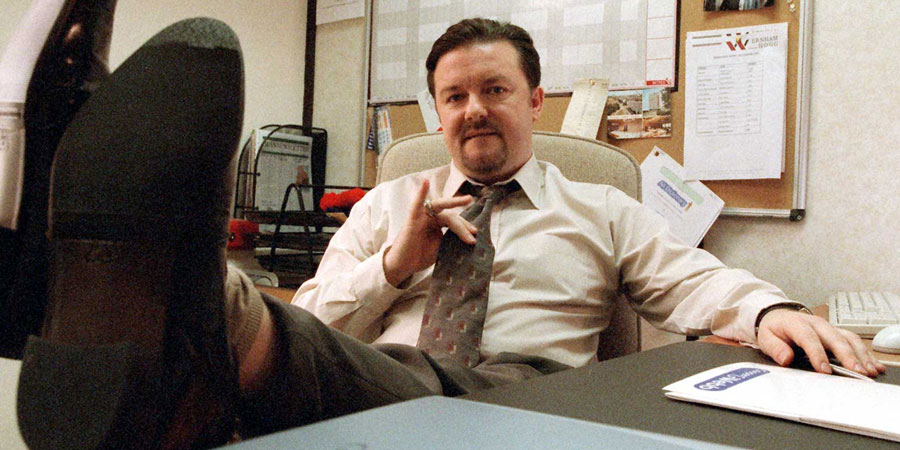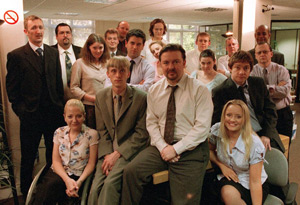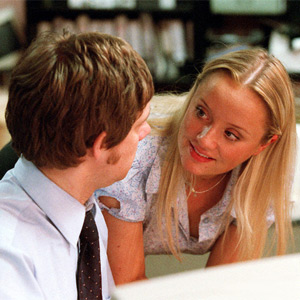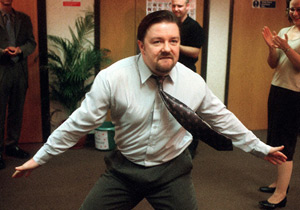About The Office (original) (raw)

One of the most popular and successful sitcoms of its decade, Ricky Gervais and Stephen Merchant's award-winning The Office is in fact a mockumentary, spoofing the glut of fly-on-the-wall documentary-reality shows that were popular in the late 1990s and early 2000s. It focusses on the Slough branch of a fictional paper merchant, Wernham Hogg. Cameras eavesdrop on office manager David Brent and his team as they go about their business.
History

Having worked as a university's students' union entertainment manager for seven years, Ricky Gervais managed to blag his way into being employed as Head of Speech at radio station Xfm. Apparently overwhelmed by work (in reality he just didn't have a clue), Ricky requested an assistant which arrived in the form of 'lanky, goggle-eyed freak' Stephen Merchant.
Since his time at the students' union, Gervais had been developing a character called Seedy Boss, and Merchant, undertaking a production training course at the BBC, was given the assignment of filming a project. In June 1998, the pair committed Gervais's character to tape. They produced a 20 minute film based loosely around the character and submitted to the BBC as part of Merchant's course. Impressed with the short, the BBC commissioned Ricky and Stephen to write a full pilot episode.
Like the series that followed, the film was based largely on Gervais's experience in the union office environment. It was not a conscious decision to base the office around the paper industry, which is why very little of the storyline concerns this.
Characters

Brent, played by Gervais, is the inept, egotistical, hypocritical, lying, two-faced boss of the branch who constantly courts disaster and makes enormous faux pas. Conscious of the omnipresent TV cameras, he struggles to present a New Man image but is often caught in unguarded or saying the wrong thing to camera; some of the show's best moments are when he is trying to dig himself out of a hole after saying something enormously un-PC.
Subordinate to him is junior manager Gareth, once a Territorial Army slogger and now a weasley and pedantic company man loyal to his boss and mainly concerned with his position in the firm. Gareth sits opposite Tim, a witty, down-to-earth sales rep who is exasperated by and constantly at loggerheads with Gareth - the pair often squabble like children. Tim has an obvious crush on the quietly-spoken receptionist Dawn but her boyfriend stops him pursuing his feelings. There are many other background characters fleshing out the workplace, including slow Keith and Finchy, an appalling specimen of humanity.
Casting

Presented in a 'mockumentary' style, it was crucial that the actors were relatively unknown, but nevertheless wholly capable performers...
Martin Freeman originally read for the part of Gareth, but found a more suitable role in Tim. It would take a courageous man to fill the shoes of 'weasel-faced arse' Gareth, particularly as Ricky and Stephen had very specific ideas about the type of person who would be cast. They, Stephen especially, were looking for a sort of 'Norm' character (from US sitcom Cheers), possibly somewhat obese and a hardcore army man to boot.
Mackenzie Crook got three call-backs, but Merchant was far from convinced that he was the man for the job. Ricky was relatively assured, exploring the possibilities of what Mackenzie could get away with due to his 'bird-like' appearance.
Lucy Davis, daughter of comedian Jasper Carrott and an accomplished actress in her own right, was cast as Dawn. Ricky and Stephen had the final say in all castings and Gervais continued as the notorious, chilled-out entertainer David Brent.
Plot
Brent's staff face the constant threat of redundancy and/or a merger with the company's Swindon branch: at the end of the first series this becomes a reality. Despite his obvious inadequacies, Brent is kept on, though many of his staff are not so fortunate. He breaks the news to them in typically crass fashion: "I've got some good news and some bad news. The bad news is that a lot of you have been made redundant, the good news is that I've been promoted."
His happiness is short lived, however. The second series finds Brent at loggerheads with Neil Godwin, the Swindon boss who, as Brent puts it, is now 'technically' his boss; moreover, Godwin seems to possess all the attributes (wit, likeability, efficiency) that Brent himself lacks, even if he thinks otherwise. Tim continues to have feelings for Dawn but because she is engaged to the boorish Lee he hooks up instead with the brassy Rachel.
In the final episode of Series 2, Wernham Hogg's management seem to have finally realised Brent is wholly incapable and is told to leave. This breaks his heart as the office was his life and sole love. Two Christmas specials followed which tied up all the loose ends, explaining what Brent did after being sacked and showed the office getting on as normal.
Further Points

Unlike many other sitcoms before it, there are no obvious out-and-out jokes in The Office. Filmed on a closed set (in disused office space at Teddington Studios) rather than in front of an audience, there's also no laughter track, and in keeping with the reality shows it attempted to emulate, the series possesses a very different visual style to many other sitcoms before it. There are jerky camera moments, quick zooms and characters talking directly to camera. This all adds up to make the show more believable and thus even more embarrassing to watch.
The Office has seen major award success, notably winning a number of BAFTAs and beating the top American sitcoms at the 2004 Golden Globes. Much of the credit must go to Ricky Gervais, whose performance as Brent was spot-on, and whose resolve (alongside co-creator Stephen Merchant) to end the series after just 14 episodes ensured it did not drag on with diminishing quality levels.